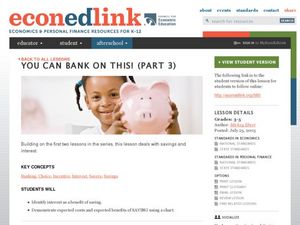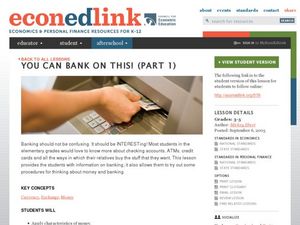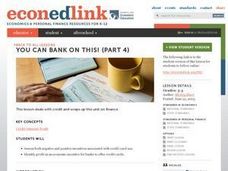Council for Economic Education
Jokes, Quotations, and Cartoons in Economics
Humor offers a great tool teach the basics of economics to scholars via video clips, satire, and political cartoons. Individuals create their own economic humor to present to the class—with the assistance of Daryl Cagel's online...
Council for Economic Education
The Role of Government: The Federal Government and Fiscal Policy
Give learners a crash course in balancing the books on the United States federal government level with an economics and government resource. Class members engage in a warm-up discussion and brainstorming session before answering...
Council for Economic Education
Teaching Economics Using Children's Literature
Introduce young learners to the subject of economics using their favorite stories and books. Including 24 separate lessons, this guide covers economic principles such as trade, scarcity, consumer goods and services, renewable and...
Council for Economic Education
I'll Trade You a Bag of Chips, Two Cookies, and $60,000 for Your Tuna Fish Sandwich
If you are looking for a great lesson on supply, demand, market price, demand curves, and data analysis look no further. With glossary definitions, activities, and web lined resources this lesson is a winner.
Council for Economic Education
Morality in Markets: The Two Faces of Adam Smith
Economist Adam Smith supported free enterprise, he but critiqued mercantilism. These two ideas—seemingly contradictory—may be difficult for some young historians to grasp. A reading that explores these ideas guides scholars in unraveling...
Council for Economic Education
Paper Money of the Sung, Yuan, and Ming Dynasties
Why did the Chinese develop paper money? They were the first society to use paper currency. Learners consider why paper money was more convenient than other mechanisms of trade using a helpful lesson plan, which includes a graphic...
Council for Economic Education
Mansa Musa: Inflation Then and Now
Mansa Musa was so rich that his gifts of gold made the value of the metal drop throughout Africa. As he traveled from Mali to the Middle East to make hajj, his gifts were so extravagant, they devalued the gold already in circulation....
Council for Economic Education
Athens and Olive Oil
Athens had olive oil—and lots of it! However, it needed wheat from the Egyptians. Understanding how societies get what they need through advantage and trade can be complicated. A scripted role-play exercise and in-class production...
Council for Economic Education
India and the Caste System in 200 B.C.E.
Many young people know India had a caste system that prevented social mobility and structured Indian society. The connections between the caste system and economics may not be as clear, however. A reading, chart activity, and PowerPoint...
Council for Economic Education
You Can Bank On This! (Part 3)
Young scholars use a chart to show how gaining interest is a beneficial part of having a savings account. In this banking lesson plan, learners also learn about the workings of an ATM and a checking account.
Council for Economic Education
You Can BANK On This! (Part 1)
Students investigate the concepts of money management and banking through Internet activities. In this economics lesson plan, students discuss the characteristics of money and how people once bartered with goods instead of paying with...
Council for Economic Education
NOT Your Grandma's Lemonade Stand
Students participate in a WebQuest to apply economic concepts. In this economics lesson plan, students are guided to various websites and simulate being an entrepreneur.
Council for Economic Education
Government Spending: Why Do We Spend the Way We Do?
Students examine the categories for federal spending using the internet to locate them. They create a list of expenditures noting them as government purchases or transfer payments. They analyze the patterns of spending during the past 40...
Council for Economic Education
Tapped Dry: How Do You Solve a Water Shortage?
Students, after evaluating different allocation methods for water, determine the costs and benefits of each method.
Council for Economic Education
One is Silver and the Other's Gold
Learners investigate the money supply and how it can affect the value of money. They examine how the changing money supply can affect prices.
Council for Economic Education
A Perfect Pet
Students read the story "The Perfect Pet". They examine how scarcity is a problem in society when people can not have everything they want which forces them to make (economic) choices.
Council for Economic Education
Timing Is Everything
Students discuss the incentives and opportunity costs of spending vs. saving. They follow an interactive website which shows them the how much money they could end up with by saving instead of spending.
Council for Economic Education
Trade in Colonial America / NAFTA
Learners learn the how trade impacted the colonial economy. They analyze the the benefits of NAFTA and learn the advantages to both the United States and Mexico.
Council for Economic Education
Cost/Benefit Analysis: Three Gorges Dam
Students, in groups, take various roles in evaluating the costs/benefits of the Three Gorges Dam project on the Yangtze River in China.
Council for Economic Education
You Can BANK on This! (Part 4)
Students assess both negative and positive incentives associated with credit card use. They identify profit as an economic incentive for banks to offer credit cards.
Council for Economic Education
Did You Get the Message?
Students investigate how advertising gets the buyer's attention and how it influences buying decisions. They then create a print ad for "Burp Cola" and for one of their favorite books.






















